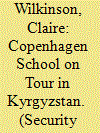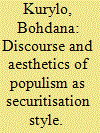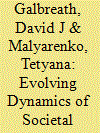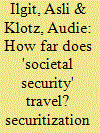|
|
|
Sort Order |
|
|
|
Items / Page
|
|
|
|
|
|
|
| Srl | Item |
| 1 |
ID:
077204


|
|
|
|
|
| Publication |
2007.
|
| Summary/Abstract |
The article argues that the theoretical framework presented by the Copenhagen School is currently unsuited to empirical studies outside the West owing to two factors. First, the presence of the 'Westphalian straitjacket' has prevented explicit interrogation of the normative concepts underlying the framework: there is a presumption that European understandings of society and the state are universal. Second, the centrality of the speech-act for securitization to the exclusion of other forms of expression, such as physical action, results in the theoretical framework producing a Westernized description of a given situation. The extent to which these factors limit the utility of the concepts of securitization and societal security in a non-Western setting is illustrated through the case of the overthrow of the government in Kyrgyzstan in March 2005. This example forms an empirical critique to highlight how theoretical shortcomings result in a simplified and Westernized description of the situation that does not take into account the specific local socio-political context. The article concludes that if the Copenhagen School's theoretical framework is to be considered suitable for universal application, future theoretical developments must explicitly address the issues discussed to enable progress in escaping International Relations' Westphalian straitjacket
|
|
|
|
|
|
|
|
|
|
|
|
|
|
|
|
| 2 |
ID:
184050


|
|
|
|
|
| Summary/Abstract |
Populists have lately been at the forefront of securitisation processes, yet little attention has been paid to the relationship between populism and securitisation. This paper investigates the role of securitisation in populism, exploring how the populist mode of securitising differs from traditional securitisation processes. It argues that securitisation is inherently embedded in populism which embodies a particular style of securitisation with a distinct set of discursive and aesthetic repertoires. The populist invocation of societal security and their claim to defend the fundamentally precarious identity of ‘the endangered people’ necessitate an unceasing construction of new threats. Aiming to discredit ‘elitist’ securitisation processes, populism invests in a specific construction of the referent object, the securitising actor and their relationship to the audience. The populist securitising style also carries a distinctive aesthetic centred on ‘poor taste’, sentimental ordinariness and unprofessionalism, examining which can widen our understanding of the aesthetics of security.
|
|
|
|
|
|
|
|
|
|
|
|
|
|
|
|
| 3 |
ID:
113727


|
|
|
|
|
| Publication |
2012.
|
| Summary/Abstract |
Minority rights conditionality has been seen by scholars as a key part of the EU enlargement process. While the focus on minority rights has largely been discussed in terms of democracy and even human rights, this article argues that conditionality was a result of the securitization of minorities rather than part of an agenda to protect or empower. In this article, we look at the methods of desecuritization as factors of 'narratives, norms and nannies'. In response to Paul Roe's conclusions about the impossibility of desecuritizing societal security, we examine whether the EU, the Organization for Security and Co-operation in Europe (OSCE) and the Council of Europe have the ability to change the societal dynamics among ethnic groups in such a way as to make the desecuritization of societal security more likely. Overall, we illustrate how a focus on 'deconstructivist' and 'constructivist' approaches to societal security has failed to make European organizations important transformative actors in interethnic relations.
|
|
|
|
|
|
|
|
|
|
|
|
|
|
|
|
| 4 |
ID:
174104


|
|
|
|
|
| Summary/Abstract |
In this essay we argue that changes in political structures in post-Soviet Ukraine have affected the potential for conflict during transition. Relying on organisational theory to determine the potential for conflict in Ukraine, we argue that this potential is structurally determined by the changing character of societal relations within and beyond Ukraine. The potential for conflict was always present in post-Soviet Ukraine, but this essay examines the facts of when, how and why conflict happened, and how it was related to weak state institutions, centre–periphery relations and an unsettled relationship with Russia. Relying on our analytical framework, we conclude that the conditions for further conflict greatly outweigh the conditions for peace.
|
|
|
|
|
|
|
|
|
|
|
|
|
|
|
|
| 5 |
ID:
131250


|
|
|
|
|
| Publication |
2014.
|
| Summary/Abstract |
Responding to political developments in Europe during the 1990s, the Copenhagen School drew on speech act theory to argue that state leaders represent certain issues, including immigration, as existential threats to society. Two decades of friendly amendments and vociferous critiques have raised questions about how well the Copenhagen School's core concept of 'societal security' travels outside Europe. To assess the scope of this 'securitization' framework more systematically, we examine South Africa, a democracy that recently liberalized its immigration policies despite ethno-nationalist and racist traditions. Specifically, we test four claims: (1) that official discourses will target certain foreigners as an existential threat to collective identity; (2) that bureaucracies will consistently institutionalize these discourses; (3) that identity-oriented groups will be crucial to any societal contestation over these discourses; and (4) that successful securitization produces regionalization. These securitization claims hold up well, even though the nature of threats to societal security shift over time. Keeping in mind that no theory is without weaknesses, we recommend wider integration of the societal security concept into comparative studies of immigration policy, especially in democracies outside Europe.
|
|
|
|
|
|
|
|
|
|
|
|
|
|
|
|
| 6 |
ID:
191519


|
|
|
|
|
| Summary/Abstract |
How do Norwegian government officials perceive the dilemma between liberty and security after the 2011 terrorist attacks? A survey from 2016 shows that the central government officials’ attitudes are rather similar to the general population. Both are willing to trade individual rights for more societal security. Structural, cultural, and demographic features explain variations in the civil servants’ views. Position and perceptions of crisis management capacity make a difference. Officials responsible for crisis management are more willing to prioritize security. Low conflict, high trust, and a strong identification with central government creates support for security measures. Furthermore, age and gender matter.
|
|
|
|
|
|
|
|
|
|
|
|
|
|
|
|
| 7 |
ID:
109915


|
|
|
|
|
| Publication |
2011.
|
| Summary/Abstract |
The societal security theory posits that extreme anti-migrant hostility - such as demands to deport all migrants unconditionally - emerges when host communities see migration as a threat to the survival of their group identity. An alternative interpretation - the immigration security dilemma - attributes extreme hostility to the human tendency to prepare for the worst under uncertainty when central authority weakens. Does extreme intergroup hostility relate more to threats framed in terms of group survival or to those framed in terms of uncertainty about government capacity and migration effects? I investigate this question empirically with the Russian national survey data (2005, N = 680) asking who in Russia supports the deportation of all internal and external migrants, legal and illegal, and their children to their places of origin - an extreme and widespread view that would require forced population movements not seen in the region since Stalin's Great Terror. In multivariate tests, agreement with the societal security (survival) rhetoric explained about five percent of variation in support for unconditional, wholesale deportation of migrants; agreement with the security dilemma (uncertainty) rhetoric - about 20%. A comparison of attitudes in the same survey to Armenian, Uzbek, Chechen, and Chinese migrants and the association of each ethnic group with different types of security threat further support this finding. Hostility toward ethnic groups viewed as a weak security threat was more diagnostic of public support for wholesale deportation of migrants than hostility toward groups viewed as a strong security threat.
|
|
|
|
|
|
|
|
|
|
|
|
|
|
|
|
| 8 |
ID:
101515


|
|
|
|
|
| Publication |
2010.
|
| Summary/Abstract |
Asylum seekers can be considered some of the most vulnerable people in the world, yet this article demonstrates that in advanced industrialized states, exemplified by the UK, they are constructed as a homogeneous collective that threatens state interests. This article examines the construction of asylum seekers as a threat that is evident in British narratives. Building on works by critical security scholars, this article examines the process that led to asylum seekers being portrayed as a threat in the UK. The empirical research focuses on narratives that give insight into sentiments towards asylum seekers in the UK. Government policy, political statements and the mass media are considered. The nature of the threat examined is threefold and takes into account traditional security studies, economic or subsistence security and societal identity security.
|
|
|
|
|
|
|
|
|
|
|
|
|
|
|
|
|
|
|
|
|